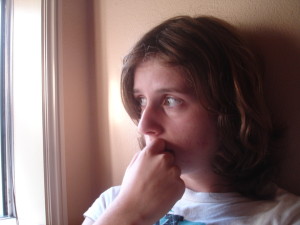
Anxiety Image Source
Anxiety is a feeling, just like anger, sadness, or joy. It can be a pointer to things that you need to pay attention to. It is a sign that you are stressed, or facing a difficult situation (such as public speaking or going to the doctor, coping with illness, your own or another’s). Anxiety is not always bad. It can be a motivator to pay attention when something is bothering you.
When anxiety becomes a problem, it’s because the feelings get too strong, don’t dissipate when the stress is over, or cause you to avoid the things that scare you.
- There are many different kinds of anxiety including:
- Generalized anxiety (the worrying kind of anxiety)
- OCD which is obsessive compulsive anxiety that may include rituals or fears about germs, etc.
- There is panic and panic attacks,
- Phobias, fears of specific events or things.
- Also, social phobia, the fear of embarrassing yourself in front of others.
- Procrastination is anxiety about getting started,
- Hoarding comes from anxiety about throwing things away.
- And post traumatic stress involves fear that bad things will happen in the future.
Symptoms of Anxiety:
- Muscle tightness and soreness
- Headaches, teeth clenching and grinding
- Worry and what if thoughts
- Shortness of breath and pounding heart
- Sweaty hands
- Agitation and inability to relax
- Insomnia
- Startle Response
- Panic (can mimic a heart attack)
- Phobias such as fear of a certain animal, or heights, etc.
- Upset stomach, stomach in knots
- Difficulty Concentrating
- Avoidance of the anxiety producing situation
Anxiety can be the feeling that instigates self-harming behaviors such as drinking, taking drugs, binge eating or purging. It is uncomfortable and people tend to want to make it go away. Other feelings can also be in underneath self harm behavior such as anger and boredom.
Getting Help
Medicine—To take or not to take?
Sometimes there is no question. Your anxiety is so bad you need to take something. Other times, medicine may see like an easier route than implementing an anxiety reduction plan for yourself. Certain antidepressants have a beneficial effect for calming anxiety, reducing worry, and helping you feel grounded. It’s the benzos that are a problem. Valium, ativan, klonopin, can all work in the short term to bring anxiety down. However, for many people there is a continuing need to take more, and the chances of getting addicted are high. Getting off these drugs can be very anxiety producing. Anyone who’s been through this kind of withdrawal knows that it’s no fun. So I recommend using only short term for acute anxiety. And if you know you are an addictive type of person, be aware! For people who feel safer with a small amount of this medicine around just in case, that’s what it’s meant for.
Understanding your situation, triggers, health issues, and history of trauma is important in getting help. Believe it or not, caffeine and sugar can be large culprits in anxiety and some people get anxiety from foods that don’t match with their nervous system. Eliminating caffeine can go a long way to feeling better. And if you are abusing drugs and alcohol, that adds to your problem. Even if you had anxiety before you started drinking and using, substances can confuse your ability to cope and cause many negative consequences and side effects.
Talk therapy can be invaluable for anxiety. You get the chance to talk about your fear, guilt, and shame in a private setting without judgement. This can feel like putting down a weight or burden. You can also learn how to identify your feelings and find ways to express yourself that feel good to you.
You form a relationship with your therapist that is caring and supportive, and your therapist can give you a heads up if you are being unrealistic or heading into self harm.
Cognitive behavioral therapy is a go-to therapy for anxiety. It targets your thoughts, helps you decide if your thoughts are the truth, and gives you ways to act on your thoughts in new and soothing ways. It helps you look for the middle ground when you are engaged in black and white thinking. As an example, if you are anxious that you made a mistake, you can talk yourself through what you did and how true your worry is. Perhaps you are exaggerating your behavior or being super critical of yourself. If you can look at your thoughts, it is possible to feel relieved and reduce the anxiety.
A combination of approaches is helpful including, meditation, relaxation techniques, and yoga. Breath work is very powerful for working with panic attacks and sooting anxiety in general. Creativity, including drawing, art-making, and writing can help to bring difficulties out of the body and into a creative form.
If you have more complex anxiety problems, then you may want to consider other forms of therapy. These include biofeedback, energy therapy, exploring food allergies and sensitivities, working with the body in somatic therapy or focusing oriented therapy, and reducing/resolving underlying trauma with EMDR therapy.
Take action to get help and hang in there to find the right anxiety reduction plan for you.
Image thanks to Joana Croft at Freeimages.com
